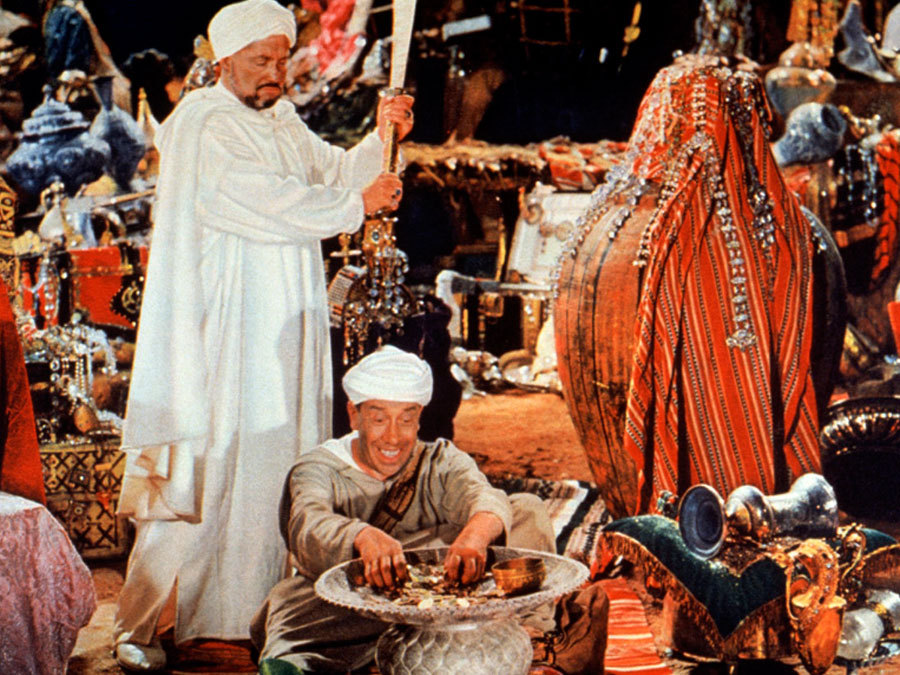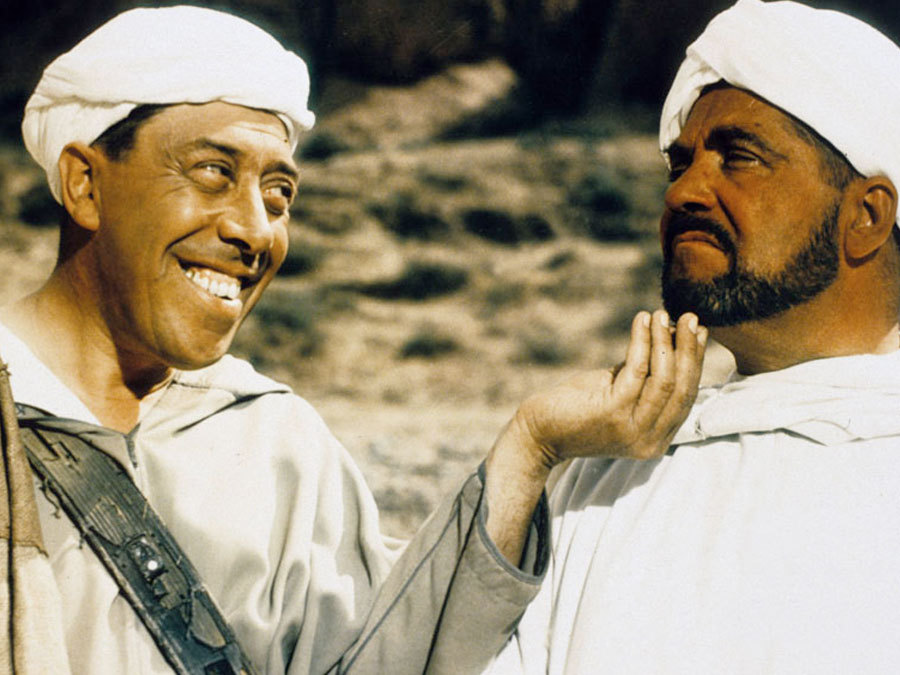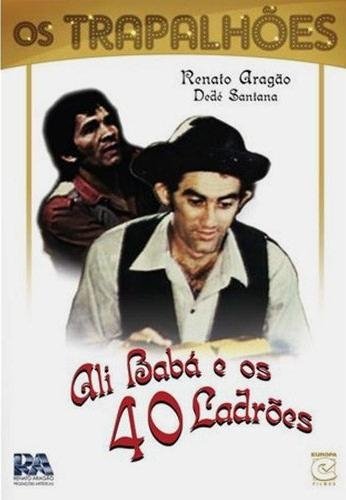1) In Ali Baba and the Forty Thieves (1944) and The Sword of Ali Baba (1965): Initially, the name of this character was taken from the bad brother of Ali Baba in the Arabian Nights fairy-tale. But in the two Ali Baba movies of 1944 and 1965, there remain only some names and the band of forty thieves in their cave from the original story. The rest o...
Show more »
1) In Ali Baba and the Forty Thieves (1944) and The Sword of Ali Baba (1965): Initially, the name of this character was taken from the bad brother of Ali Baba in the Arabian Nights fairy-tale. But in the two Ali Baba movies of 1944 and 1965, there remain only some names and the band of forty thieves in their cave from the original story. The rest of the story is quite different, and so is the character Cassim who is changed from Ali Babas rich brother to Prince Cassim, the father of Ali Babas beloved Amara and at the same time the vizier to the villain and enemy of Ali Baba, the Mongol Hulagu Khan. In the beginning of both films, Prince Cassim is shown as the friend and advisor of caliph Hassan and father of little Amara. As the Mongols have already conquered Baghdad and the caliph has escaped only with a handful of followers, Prince Cassim proposes to surrender to the Mongols and in this way not only to save the lives of hundreds of innocent people, but also the possessions and lifestyle of the caliph and his entourage - what means also Prince Cassim himself. When the caliph refuses and contemptuously calls Cassim a coward, the latter decides to sacrifice his friend. He betrays the caliph to the Mongols, the caliph is killed and Prince Cassim consequently becomes vizier to Hulagu, the Khan of the Mongols, and assists him in his tyranny for some ten years (fifteen years in The Sword of Ali Baba ). Prince Cassim is thus shown as a coward and a traitor, but you can also see him as a man who likes to be alive and as an exponent of realpolitik . There are some more interesting traits in this character when he is faced at the same time with the grown-up son of the caliph - Ali Baba - who has survived and now tries to avenge his father's death and to get back his throne AND with his own unmanageable grown -up daughter Amara who refuses to submit to his marriage plans for her.a) Ali Baba and the Forty Thieves (1944): In this first version of the film Prince Cassim introduces his daughter Amara to Hulagu Khan to whom he wants to give her in marriage in order to consolidate his position at the court of the Mongol. Amara however is not pleased when being treated in a humiliating manner by the Khan and outrightly refuses to marry the Khan. This is the first time we learn more interesting details about Prince Cassim's character as he doesn't try to force his daughter to obey, but prefers to persuade her. This he manages by a formidable speech telling Amara not only about the pernicious consequences of rebelling against the Khan's will, but also about his own sufferings and the sacrifices he had to make only to secure his daughter's good life and happiness. This includes the use of striking words and of several impressive voice tones. Here are shown the talents as well as the weak points and the blameworthy aspects of the character in a single scene. But from Prince Cassim's words we also learn something about his inner conflict which has broken the man: He speaks about his dignity which he has given away - for his daughter's sake, he tells her. So, we get the impression that he is refering to the treatment he receives from the Khan and which he is forced to endure. That's a glimpse of the more than unpleasant situation of Prince Cassim who really seems to suffer although he modifies the facts a bit to make his daughter obey. The inner conflict of Prince Cassim, though not fully worked out in the film, is his trying on the one hand to follow an easy path to preserve life, health, a comfortable situation in the material sense and some power and on the other hand the contempt he feels for himself because of his betrayal of the caliph and the humiliations he has to put up with.This is further shown in the following scene when Hulagu Khan and Prince Cassim face Ali Baba, the now grown-up son of the caliph. When Prince Cassim had betrayed the caliph to the Mongols, he called the caliph back to the riverside. The caliph and his young son Ali had just mounted a ship to go to Basra and come back with a new army to fight the Mongols. When Prince Cassim called him, the caliph immediately turned back, although one of his servants was suspicious. The caliph went ashore while his son stayed on board with the servant. During the following fight in which the caliph was killed by the Mongol soldiers the servant threw Ali into the river. Hidden behind the ship he witnessed the death of his father and the role of Prince Cassim in this event. Then he escaped and found the cave of the band of forty thieves whose leader adopted him as a son and gave him the name Ali Baba. So, Ali was able to grow up and fight the Mongols in his own way by Robin-Hood-like robbery, burning with his wish for vengeance. When Amara was brought from Basra to Baghdad to marry Hulagu Khan they posed a trap for the thieves and Ali got caught in it while talking to Amara without recognizing her. So, Ali is now enchained on the market-place and awaiting his fate. Hulagu Khan calls Cassim to come with him to the place to talk to Ali. But they don't so far know who he is. This is however discovered by Cassim soon. As an answer to the Khan's promise to spare his life if he tells him the hiding place of the forty thieves, Ali insults him as the enemy of his people and Cassim as the murderer of the caliph. Cassim is shocked - presumably because he didn't tell anyone about his role in the killing of the caliph - and climbs up to Ali to find out who he is. In fact, he finds the royal seal hidden under Ali's shirt and speedily decides not to let the Khan know about it. So, he tells Hulagu that he can manage to find out the hiding place of the thieves alone. The Khan leaves the captive to his vizier and rides away. Now, Cassim tells Ali that he has recognized him and we can see that this is anything but a nice discovery for him although he should be happy that the enemy who desires most ardently to kill him is a captive and will be executed the next day. Most important to understand Cassim's character is here to realize his reaction to Ali's talking about his father, the caliph and friend of Cassim. In this moment Cassim just lowers his head and tells Ali in a revealingly vehement manner not to talk about the dead caliph any more. In this situation it is obvious that he is not the kind of cold-hearted villain for whom it doesn't matter if he has to betray, to murder or to torture other people and who even likes to see people suffer. Prince Cassim, in contrast, is not proud of his own deeds, especially of his betrayal of the caliph. He even suffers from having done so and there is much to indicate that he does at least feel ashamed of his treason, if he does not actually regret it. You can see this even as soon as it becomes clear that he has set a trap for the caliph. In the moment the caliph is killed you see Cassim averting his eyes to the ground and you see him lowering his had after his identification of the dead caliph - in both cases his face looks anything but happy. So, there are reasons to think that he felt under pressure to do so, although this is never directly stated. But it is implied by what he tells Amara to persuade her to marry the Khan.If you further watch Prince Cassim's behaviour, it becomes clear that he might have thought treason to be the only way for himself. There is one main character trait in Cassim which makes him one of the villains of the film: fear.(to be continued)
Show less «




